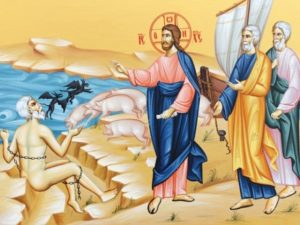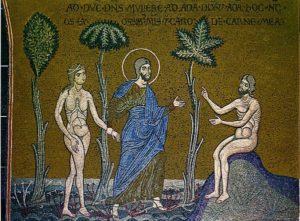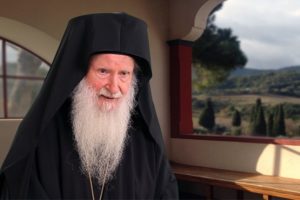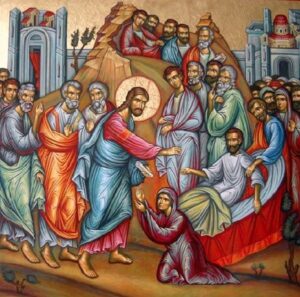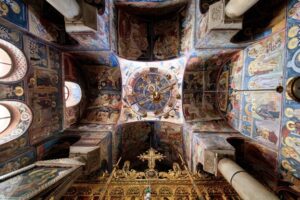Which Came First: The Church or the New Testament? – 4
1 February 2016[Previous publication:http://bit.ly/1QtDaug]
THE GOSPEL ACCORDING TO WHOM?
Next, I was surprised to discover that many “gospels” besides those of the New Testament canon were circulating in the first and second centuries. These included the Gospel according to the Hebrews, the Gospel according to the Egyptians, and the Gospel according to Peter, to name just a few. The New Testament itself speaks of the existence of such accounts. Saint Luke’s Gospel begins by saying, “Inasmuch as many [italics added] have taken in hand to set in order a narrative of those things which have been fulfilled among us … it seemed good to me also … to write to you an orderly account” (Luke 1:1, 3). At the time Luke wrote, Matthew and Mark were the only two canonical Gospels that had been written. In time, all but four Gospels were excluded from the New Testament canon. Yet in the early years of Christianity there was even a controversy over which of these four Gospels to use.
Most of the Christians of Asia Minor used the Gospel of John rather than the Gospels of Matthew, Mark, and Luke. Based upon the Passion account contained in John, most Christians in Asia Minor celebrated Easter on a different day from those in Rome. Roman Christians resisted the Gospel of John and instead used the other Gospels. The Western Church for a time hesitated to use the Gospel of John because the Gnostic heretics made use of it along with their own “secret gospels.” Another debate arose over the issue of whether there should be separate gospels or one single composite gospel account. In the second century, Tatian, who was Justin Martyr’s student, published a single composite “harmonized” gospel called the Diatessaron. The Syrian Church used this composite gospel in the second, third, and fourth centuries; they did not accept all four Gospels until the fifth century. They also ignored for a time the Epistles of John, 2 Peter, and the Book of Revelation. To further complicate matters, the Church of Egypt, as reflected in the second-century New Testament canon of Clement of Alexandria, included the “gospels” of the Hebrews, the Egyptians, and Mattathias.
In addition they held to be of apostolic origin the First Epistle of Clement (Bishop of Rome), the Epistle of Barnabas, the Preaching of Peter, the Revelation of Peter, the Didache, the Protevangelium of James, the Acts of John, the Acts of Paul, and The Shepherd of Hermas (which they held to be especially inspired). Irenaeus (second century), martyred Bishop of Lyons in Gaul, included the Revelation of Peter in his canon.
OTHER CONTROVERSIAL BOOKS
My favorite New Testament book, the Epistle to the Hebrews, was clearly excluded in the Western Church in a number of listings from the second, third, and fourth centuries. Primarily due to the influence of Augustine upon certain North African councils, the Epistle to the Hebrews was finally accepted in the West by the end of the fourth century. On the other hand, the Book of Revelation, also known as the Apocalypse, written by the Apostle John, was not accepted in the Eastern Church for several centuries. Among Eastern authorities who rejected this book were Dionysius of Alexandria (third century), Eusebius (third century), Cyril of Jerusalem (fourth century), the Council of Laodicea (fourth century), John Chrysostom (fourth century), Theodore of Mopsuesta (fourth century), and Theodoret (fifth century).
In addition, the original Syriac and Armenian versions of the New Testament omitted this book. Many Greek New Testament manuscripts written before the ninth century do not contain the Apocalypse, and it is not used liturgically in the Eastern Church to this day. Athanasius supported the inclusion of the Apocalypse, and it is due primarily to his influence that it was eventually received into the New Testament canon in the East. The early Church actually seems to have made an internal compromise on the Apocalypse and Hebrews. The East would have excluded the Apocalypse from the canon, while the West would have done without Hebrews. Simply put, each side agreed to accept the disputed book of the other. Interestingly, the sixteenth-century father of the Protestant Reformation, Martin Luther, held that the New Testament books should be “graded” and that some were more inspired than others (that there is a canon within the canon). Luther gave secondary rank to Hebrews, James, Jude, and Revelation, placing them at the end of his translation of the New Testament. Imagine-the man who gave us sola scriptura assumed the authority to edit the written Word of God!








